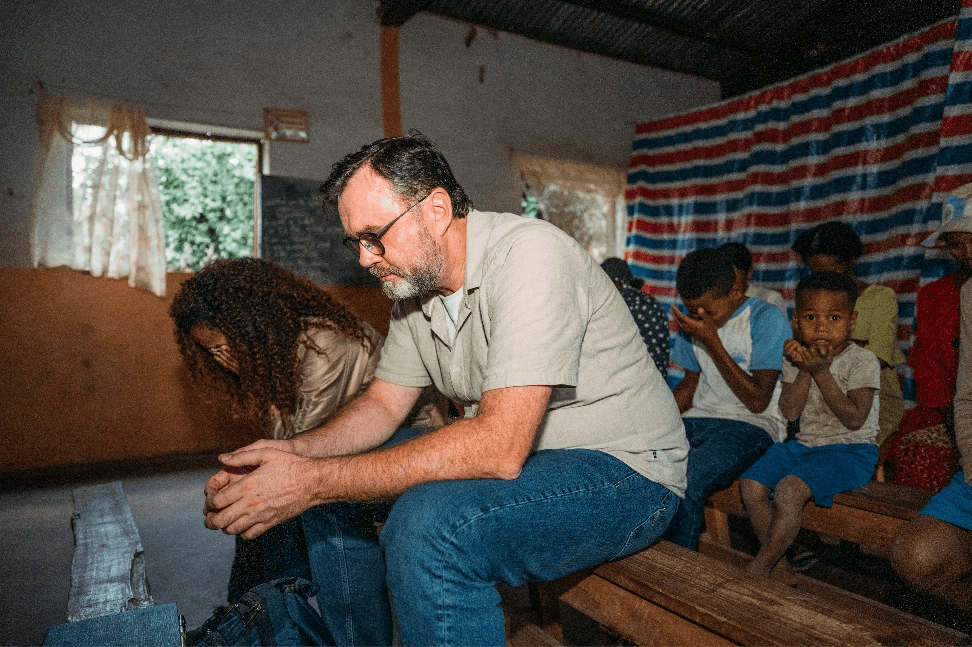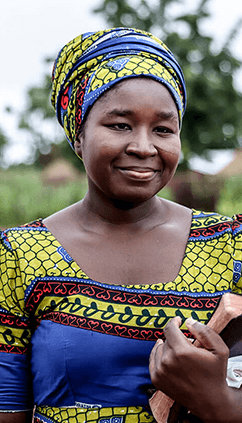The Power of Faith Despite Poverty
These words, coming from a lady who struggled to put one decent meal a day on the table, deeply touched me. Marie comes from a family of poor farmers. She earns a living by selling vegetables or the snacks she cooks. It’s hardly enough to make ends meet. Yet, she pointed to the Word of God as her life’s treasure. It humbled me.
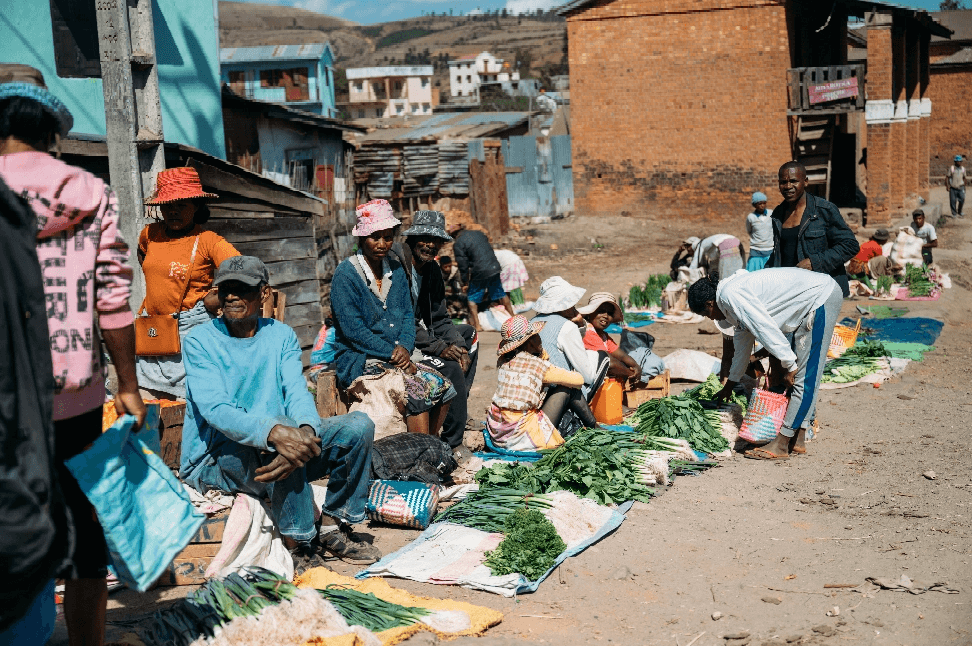
Stagnation
My recent trip to Madagascar was a humbling experience, humbling and emotional. I can safely say the island nation is the poorest country I’ve been to. Since it gained independence from France in 1960, Madagascar hasn’t developed significantly. On the Human Development Index (HDI), the country ranks 173rd out of 191 countries. And according to the World Bank, 75% of Madagascar’s population lives below the poverty line.
The economic stagnation was conspicuous everywhere I went. Even in the capital, Antananarivo, buildings and roads were in terrible neglect. All along the roadsides, hawkers tried to make some money selling everything they could possibly sell. Small food stalls had their meat, rice, vegetables, and fruits exposed to an outpouring of clouds of oily smoke from Antananarivo’s never-ending traffic jam. Most people drove French cars from the 1980s and 1990s that had been patched up who knows how many times already. I saw a small, almost naked kid looking for a scrap of food in a garbage heap on a street corner while, right next to the dump, a vendor was cooking snacks.
Those who couldn’t afford a French old-timer traveled on carts drawn by zebus (humped cattle), on bicycles, or on foot. Rugged, lean, yet muscled men pulled wooden carts loaded with bags of charcoal. Others drove their cattle across the streets, slowing the traffic even more. In this tumultuous and smelly chaos, it took us hours to travel just a few miles.
Celebration in Mahazina
The situation in the countryside wasn’t much better. Fewer cars, more cattle, often herded by children, but the same evident poverty. The Route National 1 (RN1) that connects Antananarivo with the interior is a narrow, two-lane road, but at least it’s paved. Madagascar is twice the size of Arizona but has less than 4,000 miles of paved roads. In comparison, Arizona has over 130,000 miles of paved roads. Branching off the RN1 means exchanging the blacktop for dust. One of these dirt roads brought me to Mahazina, where I met Marie, whom I quoted at the start of my story.
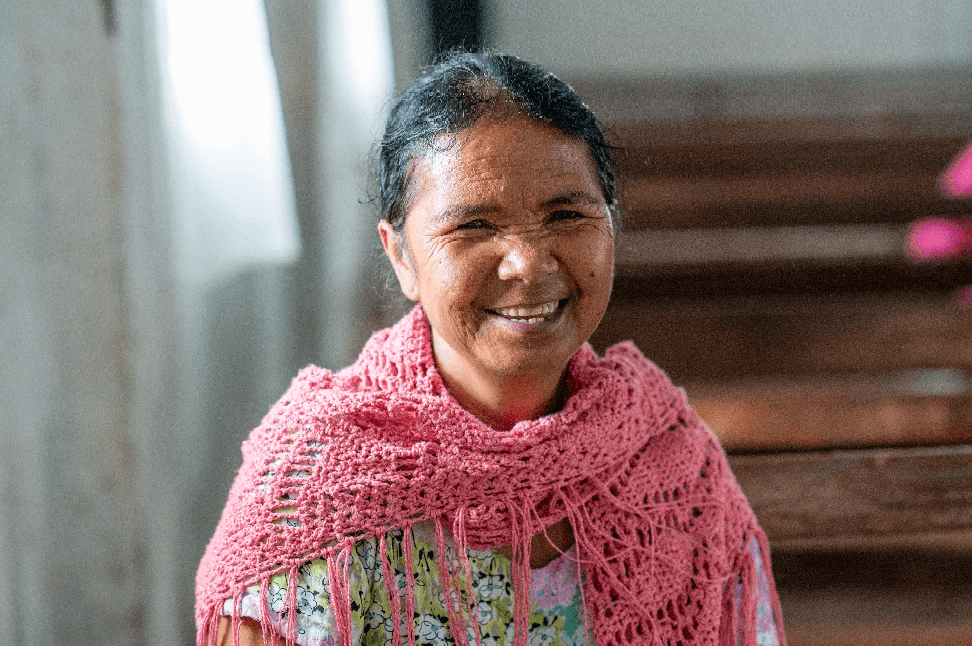
Mahazina, a few miles north of Soavinandriana, a town in the Itasy Region, is a tiny rural village with dirt roads covered with cow dung. A narrow, bumpy path led to a church on the village outskirts. It was a humble, barn-shaped building with small square windows, turquoise wooden hatches, and a roofed porch, all in dire need of a fresh coat of paint. Inside, 45 people sat on uncomfortable wooden benches, waiting eagerly to receive their Bibles after completing a Bible League Bible study program.
The Bible League team in Madagascar made sure the Bibles came to the right hands, for which they carefully checked the attendance lists. It was a long process, and the people were waiting patiently and silently all the time. Finally, when all had their copy of God’s Word, one of the men grabbed a traditional double-sided drum and started playing it. All rose and sang out their gratitude in a couple of worship songs. Swaying from left to right to the drum rhythm, some raised their hands and waved while others clapped to the beat. One of the ladies lifted her Bible high with both hands, almost in ecstasy. These people cherished God’s Word!
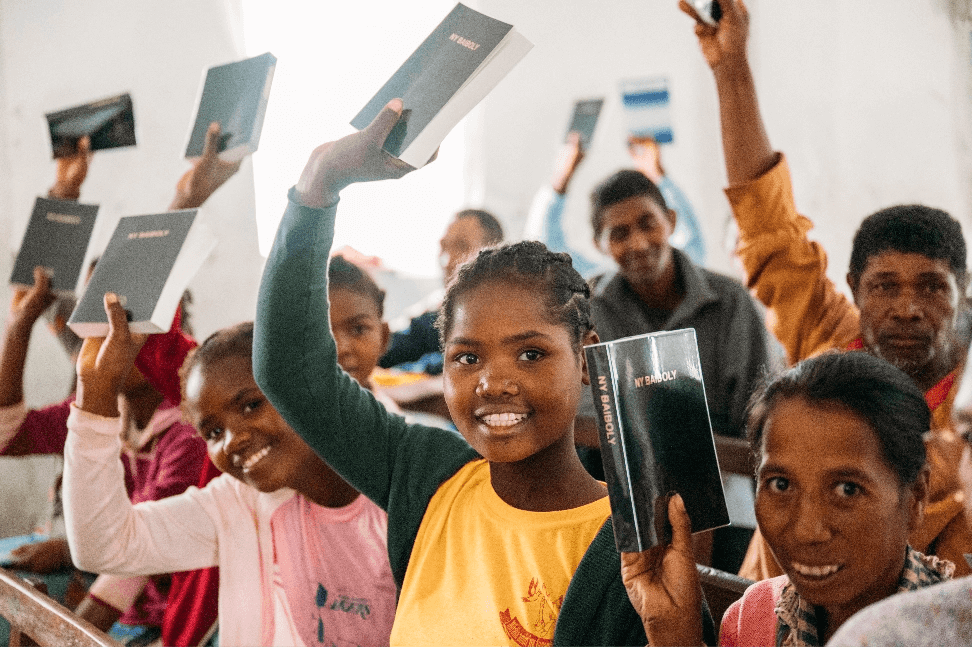
Offering
Marie had already hinted at the challenging economic situation in Mahazina. The graduates had dressed for the festive occasion, but even their best clothes were old and washed out. Nevertheless, their pastor announced a spontaneous money collection. “We have received our Bibles today,” he said. “Let’s now express our gratitude to Bible League International by making a donation so that they can buy more Bibles for the ministry in Madagascar!”
The congregants passed a basket around the pews, and it returned with a good handful of well-thumbed Ariary bills. “It’s maybe enough for one Bible,” the pastor said as he presented the money to the Bible League team. To me, Mark 12 came to life where Jesus said about the poor widow, “The truth is, she gave more than all those rich people,” adding that “it was money she needed to live on.”
Taboos
Spiritually, Madagascar is a poor nation, too. Since the French colonization, the Roman Catholic Church has been dominant. However, those with a Catholic background I talked to all mentioned their faith was dead. Outside the church—but even inside—pagan traditions are still widespread. Hundreds of thousands of people adhere to ancestral worship, animism, and sorcery. A deep-rooted fear of evil spirits dictates their lives.
One of the striking religious features of the island nation is a system of taboos, fady in the Malagasy language. With everything you do, you can disturb the spirits, which are believed to dwell in trees, rocks, rivers, in practically everything. That’s why you can’t point your finger at graves, for instance, walk in a particular direction on a certain day, or eat specific food. If you have broken a taboo and called down an evil spell on yourself, you’ll need to consult a witch doctor to help you. I’ve heard shocking stories of the magical powers these witch doctors possess.
Multiplication
Yet—thank God!—I’ve also heard people share how the grace and love of Christ helped them overcome all their fears and rendered all magic charms powerless. Let me take you to Ankazondandy, where I met Pastor Jacques. His village presented itself as a handful of picturesque stone houses with balconies and porches around a church on a hilltop. A farmer on a nicely painted cart steered his two oxen across the crooked dust streets, waving joyfully at me. It was as if time had stopped moving two centuries ago.
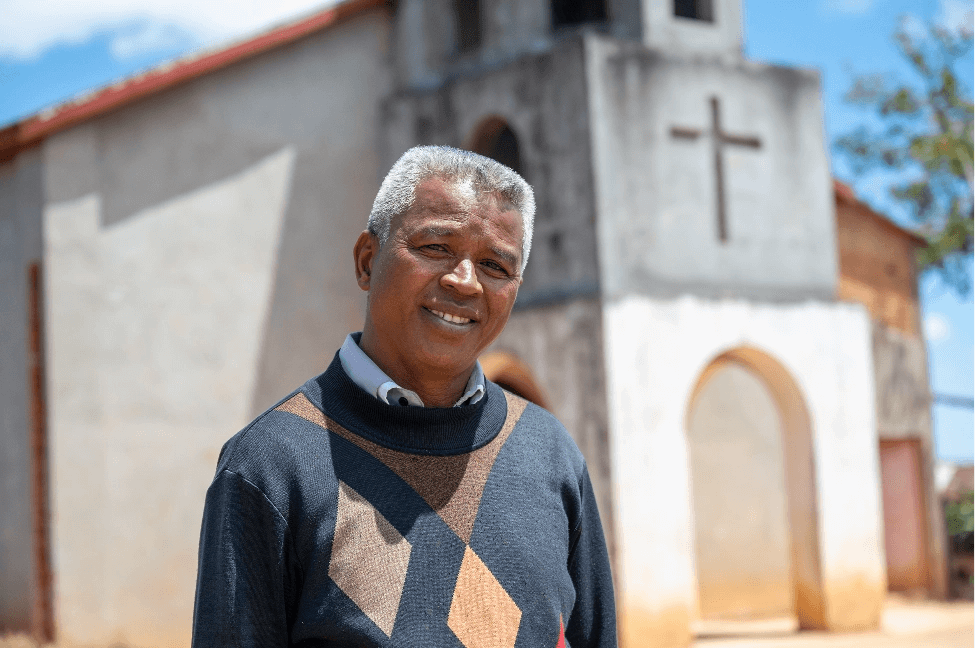
In Pastor Jacques’ church, which was in a rather poor state of maintenance, I witnessed a Bible League promotional meeting attended by pastors and church leaders from the vast region. Pastor Jacques shared with excitement how his church had been growing numerically and spiritually because of Bible League’s Bible study program. The attendees responded enthusiastically. It was fulfilling to see the multiplication of our programs firsthand.
Pastor Jacques then gave a short tour through his village, which is a center of sorcery, he pointed out. He showed a rock where the villagers frequently sacrifice animals to appease a demon. Ankazondandy also hosts an annual festival of witchcraft, attracting people from the wide area to perform rituals and sacrifice animals. Yet, the Gospel of Christ is breaking this stronghold! I spent some beautiful moments with four different Bible study groups, all with members from a pagan background.
Julienne
On a dusty street in Ankazondandy, I met a lady named Julienne, who loved to have me interview her. She was 84 and, literally clothed in dirty rags, obviously destitute. Despite that, she started the conversation by praising the Lord for His provision. That morning, she and her husband had gone down to the river and caught two fish, enough to eat for at least one day. She praised the Lord for His grace!
Later, she cried while talking about her daughter, who, after consulting a witch doctor, had lost her mind. Julienne wasn’t able to communicate with her anymore. Then, ever so suddenly, the old lady fell on her knees, raised her hands in adoration of the Lord, and started praying … for me! There I was, with all my Western privileges, with an elderly lady deprived of any luxury, praying for me. My eyes were wet. It was one of the most humbling and emotional interviews I have ever done.
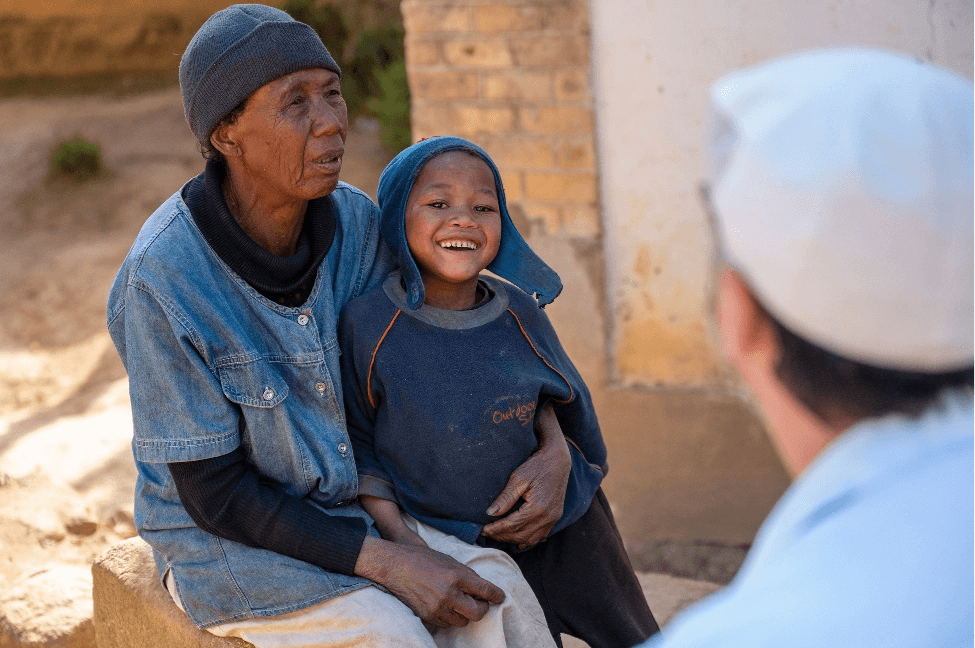 Julienne pictured left
Julienne pictured leftImpact
In just about two years, our Madagascar Bible League team has established a vast network of pastors and volunteers who run the Bible study program. Acts 12:24 says, “The message of God was spreading, reaching more and more people.” That is exactly what I saw happening in Madagascar. In one town, I heard about people from a rural area who come to church, traveling six miles on foot, then crossing a river with canoes, because they have become so eager to hear God’s Word!
In Ankazondandy and many other places, I heard stories about how our Bible study program helped people stuck in ancestral worship find peace in Christ. The Word of God is erasing the fears of so many people in Madagascar!
At the same time, Bibles are hard to come by for the average Madagascan. Pastor Pascal from a small town named Soavinandriana told me people in his community make about 30,000 Ariary (less than 7 USD) per week for a household, while a Bible is 35,000 Ariary. “That’s why many believers didn’t have Bibles before the materials arrived,” he explained. “The partnership with Bible League is truly amazing because it helps us to grow as a church in the countryside!”
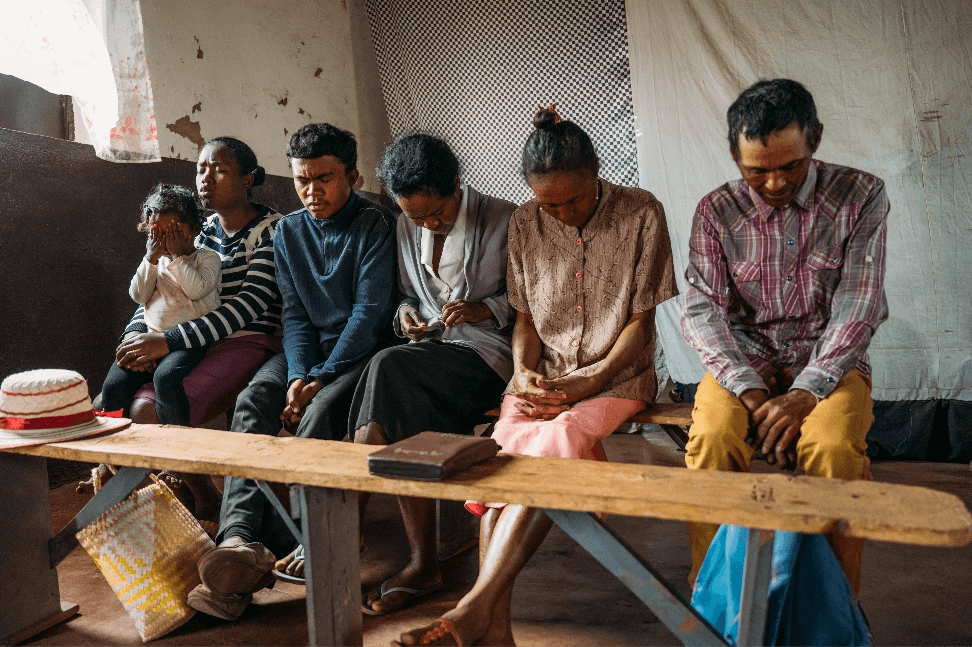
Blessed Assurance
On the last day of my trip, I was in Alakamisy, where I visited a small local church led by Pastor Jimmy. Here, two Bible study groups had just started going through our Gospel of John booklet. Pastor Jimmy said his church ran twelve (12!) Bible study groups, including one using the Audio Bible. At the end of the meeting, I asked the pastor if they could sing a song. He took his guitar (a little out of tune) and started “Blessed Assurance.” One of my favorite hymns—how did he know that? Once more, tears came to my eyes as I realized how God’s love is in the details.
Can I, with the wealth and riches I’m used to in the Netherlands, fully grasp what that means: “Jesus is mine?” That’s what I wonder while writing this. Would I really suffer, like Marie, without God’s Word? Do I, in fact, have a clue of what suffering is? What do 7 dollars mean to me other than small change, whereas people in Pastor Pascal’s church don’t even have that sum to buy a Bible? What do I understand of Julienne’s gratitude for catching two fish while I can buy whatever I please at the grocery store? There are so many mundane things I call mine and seek assurance in. The people I met in Madagascar are deprived of all that luxury, and that’s why they can truly sing “Jesus is mine.” Because they have nothing else left. Despite their grinding poverty, they are so rich in Christ!
Reflecting on my trip’s experience, I realize that when it comes to receiving grace, I’m a poor beggar myself. Thank You, Jesus, for that lesson in humility. Thank you, my Madagascan brothers and sisters, for helping me realize how precious Jesus is. I will join you and continue “praising my Savior all the day long.”
